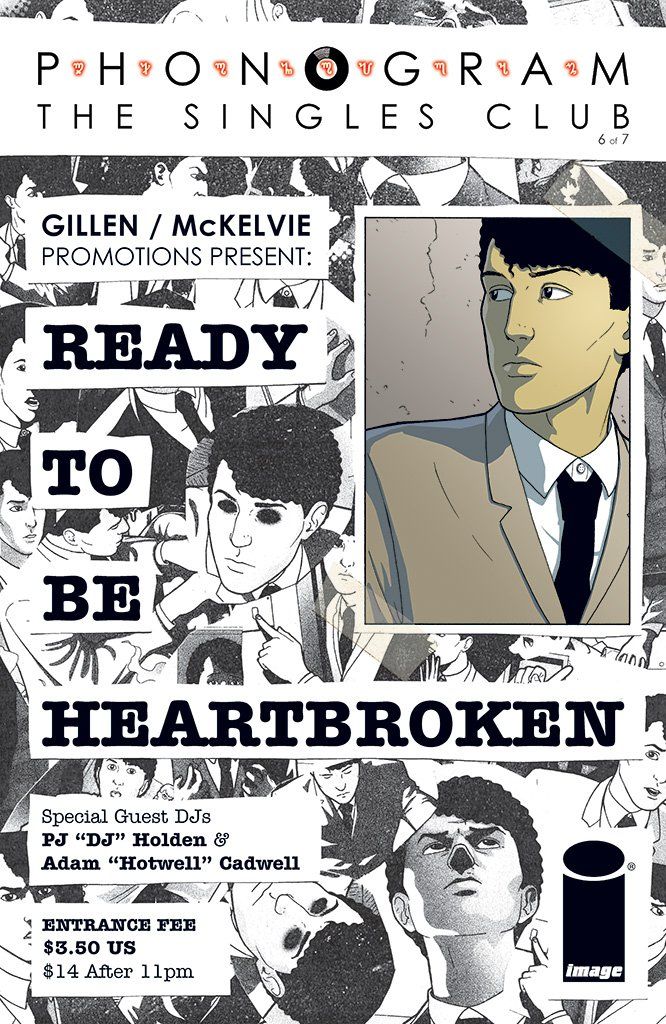Strangely, for a series that was once known to its friends and detractors alike as "That Britpop Comic," "Phonogram 2" doesn't shy away from diverse subject matter. Although on the surface it's all about music, we've actually had stories about appropriately weighty (and not-so-weighty) topics like identity, heartbreak, what fun dancing is, and the microcosm that is the DJ booth. Despite being interconnected chapters of a wider story, every issue of Phonogram 2 -- this one included -- stands alone to such a degree that more pretentious people than I would happily describe it as a "graphic novella."
And speaking of pretentious: this latest graphic novella places the spotlight on Lloyd, a man obsessed with his ideas, but angry at the world and himself for their incompleteness. And when Lloyd gets angry, magic happens -- scary, misdirected magic. The previous issues have all had some degree of the supernatural in them, but it's been almost possible to dismiss it as purely metaphorical -- not so in this case. Lloyd is the first Phonomancer to really display the kind of powers we saw from Kohl in the first series, and it gives the issue a different tone to its predecessors. The emotional truths, however, are still there: creative frustration, the hardships of expressing yourself, finding new inspiration. As ever, these feelings aren't limited to appreciation of music; that's just the vector by which they're delivered in this case.
This, in fact, is a rare occasion where I get to experience "Phonogram" as an "outsider." The bands it references -- Dexy's Midnight Runners and Los Campesinos! -- are bands that I know about, but that I've never engaged with. I know they exist, but couldn't tell you what they sound like. And in spite of that, the comic works. It's how they're used, not who they are, that's important in the long run.
"Phonogram 2" has shown Gillen and McKelvie are more than capable of using the comic form to its fullest, so it's particularly clever to see them really pushing the storytelling devices a little beyond the traditional speech-bubbles-on-storyboard that most comics will happily stick to. We're almost into "Black Dossier" territory as the story occasionally becomes the photocopied fanzine as assembled by Lloyd himself (via McKelvie, as good with design as he is with pencils). This is what we like to call "Proper Comics." You just couldn't do it in any other medium.
With the prose/fanzine sections taking the place of internal monologue, there's actually very little dialogue in the issue, which leaves McKelvie shouldering the weight of the storytelling during those sequences. As usual, there's a nuance and finesse in the expression of emotion and body language, and Matt Wilson's coloring complements it splendidly; a minor shift in the color of the lighting towards the end tells us all we need to know about the passage of time between two panels.
The issue is also rounded out by two more b-sides, both starring Kohl (David, not Helmut). In the first, PJ Holden's dark and moody visuals perfectly evoke the kind of provincial drinking establishment the story is set in, and briefly return "Phonogram" to its "Hellblazer"-tinged past. Elsewhere, Cadwell's clean lines and vivid colors are an instant fit for the Phonoverse, and for someone more familiar with smaller chunks of art from his webcomic, "The Everyday," it's a treat to see him tackling full-size storytelling and composition. His is clearly a name to watch out for in the future, but then that seems to be true of just about everyone who touches "Phonogram."

